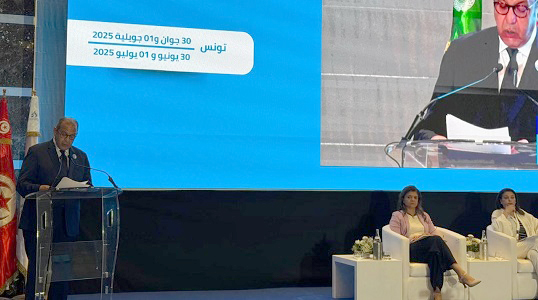Samir Majoul, President of the Union of Arab Chambers and the Tunisian Confederation of Industry, Trade, and Handicrafts (UTICA Tunisie), took part in the high-level Arab regional meeting held on June 30, 2025, in Tunis. The meeting was part of the preparations for the Second World Summit for Social Development, scheduled to take place in Qatar between November 4 and 6, 2025.
In his speech during the third session titled "Social and Economic Inclusion of Priority Groups in Social Protection," President Samir Majoul emphasized that “despite the efforts made over the past decades, Arab labor markets continue to suffer from structural crises that particularly affect youth, women, and vulnerable groups. According to the International Labour Organization’s 2024 report, the average unemployment rate in Arab countries stands at approximately 11%, compared to a global average of 5%. Youth unemployment exceeds 25% in several Arab countries and reaches over 40% in countries experiencing conflict. Meanwhile, female labor force participation in the Arab region is no more than 20%, compared to 47% globally.”
He further explained that “more than 60% of the Arab workforce operates in the informal sector, without social protection, health insurance, or retirement benefits. These numbers are not just statistical—they reflect intertwined challenges, notably the lack of economic diversification. Most Arab economies still rely heavily on natural resources, remittances, or tourism, while the contribution of productive sectors to job creation remains limited. The rapid transition to the digital economy has widened the gap between the skills required and those available in the labor market—especially with the growth of artificial intelligence. Additionally, conflicts and waves of displacement have added strain, as over 50% of the world’s refugees in 2024 originated from Arab countries, putting extra pressure on labor markets and social structures, according to the UNHCR 2024 report. Furthermore, vocational training and technical education systems remain weak, with curricula often misaligned with the needs of the green economy, digital transformation, and smart industries.”
Majoul noted that “the Arab private sector contributes more than 75% of GDP in several countries and provides over 80% of new job opportunities—particularly in industry, services, logistics, and digitization.” He stressed that, in light of this critical role, “there is an urgent need to support small and medium enterprises (SMEs), especially since they represent more than 90% of business entities in Arab countries but face difficulties in financing and digital transformation. Supporting them would significantly contribute to the economic and social inclusion of priority groups.”
Majoul proposed enhancing Arab funding mechanisms for these enterprises—especially those led by youth and women—affirming that “the Union of Arab Chambers, as the representative of the Arab private sector, has worked closely with the Council of Arab Ministers of Social Affairs to develop numerous initiatives aimed at enhancing the social and economic inclusion of the most vulnerable groups. One notable initiative is ‘Living with Independence,’ a pioneering program that leverages modern technologies to support persons with disabilities. It provides assistive tools that ease daily life and supports their entrepreneurial projects—whether through in-kind support or funding. The initiative also seeks to transform these efforts into sustainable entrepreneurial ventures, ensuring long-term viability and creating new opportunities. The support extends not only to people with disabilities but also to productive families and micro-enterprises, which are essential pillars in combating poverty and promoting inclusion.”
He continued: “To ensure the success of these initiatives, a series of training courses and workshops were organized in cooperation with several Arab chambers of commerce. These aimed to equip beneficiaries with the skills to manage their projects efficiently and transform them into successful startups. In addition, technical and advisory support was provided to help them access markets and expand their customer base.”
Majoul concluded by reaffirming “the Union of Arab Chambers’ firm belief in the importance of socially and economically integrating women and persons with specific needs. On the occasion of this high-level meeting, he reiterated the Union’s commitment to working alongside the Council of Arab Ministers of Social Affairs and within the framework of the League of Arab States to implement the directives and declarations issued by Arab summits—especially the upcoming priorities to emerge from the Tunis meeting. The Union will continue its efforts to translate these priorities into concrete initiatives and projects that make a real difference in the lives of the targeted groups, and help build a better future for Arab societies and coming generations.”
Source: (Union of Arab Chambers, Edited)

